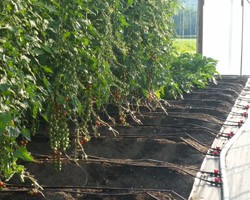Best Management Practices for Long-Term High Tunnel Soil Sustainability
Judson Reid, Extension Vegetable Specialist
Cornell Vegetable Program
April 25, 2017

Project staff worked closely with growers to analyze and respond to the results, focusing on reducing phosphorus and calcium inputs and better supplying the crop with sufficient nutrition. This reduced excess nutrient application in high tunnel soils and lead to improved net profitability as input costs decrease and yields increased. The 10 participating NYS High Tunnel growers improved tunnel sustainability by optimizing fertilizer inputs, balancing macro-nutrients, decreasing compaction, increasing organic matter levels and other related parameters through the implementation of soil BMPs.
- 6 of 10 participating growers adopted the incorporation of cover crops to the high tunnel rotation to increase organic matter, reduce compaction and reduce excess nutrients in the soil.
- 8 of 10 participating growers adopted the use of low-to-no phosphorus fertilizers to avoid further nutrient build up.
- 8 of 10 participating growers improved their pH management strategy through soil and/or water acidification.
- After participating in this project, net high tunnel income increased by an average of $1556.61, for an average increase of 26.9%.
A short video about high tunnel soil conditions, produced by NOFA-NY, features Cornell Vegetable Program Specialist Judson Reid.


































